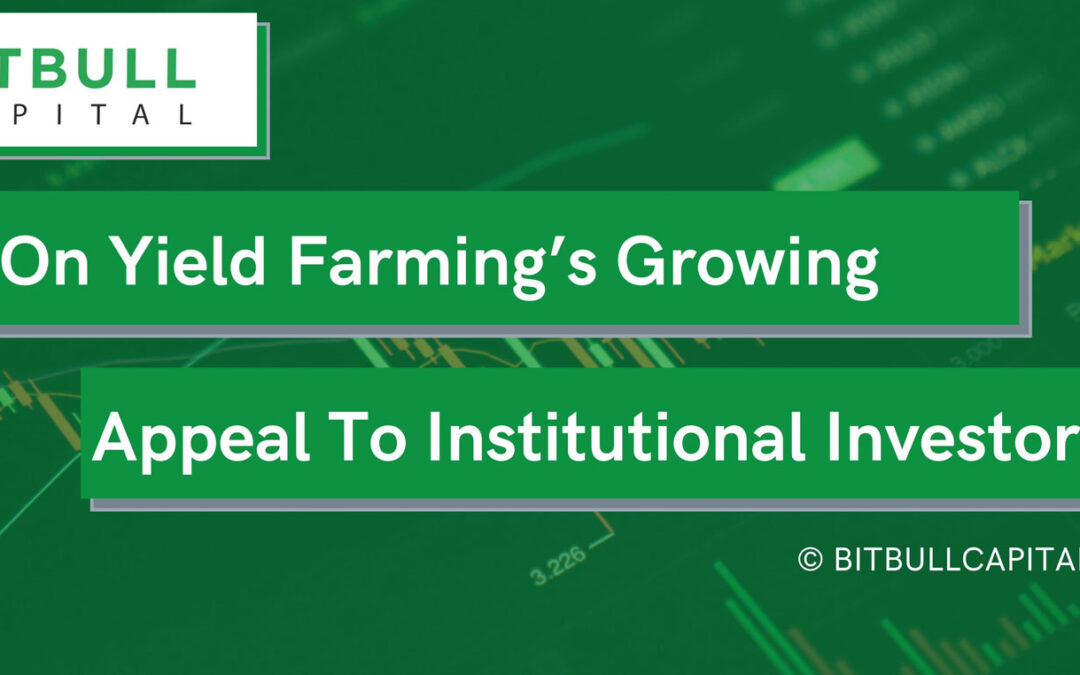Considering that 80% of institutions across the USA and Europe have expressed interest in digital assets and cryptocurrencies; as well as the unique security and pre-trade compliance needs of institutional investors; and also, market forces like potential rises in inflation, an investigation into the key drivers of increased institutional investor interest is worth analyzing.
One could point to investor interest in taking long positions in market leader BTC, for example (especially given the recent price drop in BTC) or to a desire for early-stage entry points into unicorn projects which leads to higher returns rewarded for taking higher risk.
Choosing either of these would be rooted in sound reasoning, but interestingly enough, neither of these touches on the market-neutral opportunities within the crypto space, where we can witness innovative DeFi mechanisms like yield farming becoming of specific interest to institutional investors.
However, with decentralized finance (DeFi) being, inherently, a non-custodial innovation within the crypto sector, there is an initial misalignment here with the needs of institutional investors.
The Yield Farming Solutions Meeting The Needs of Institutional Investors
In the case of yield farming specifically, which in its most basic sense entails holders “staking” crypto assets in non-custodial, DeFi protocols for the purposes of generating a return based on fixed or variable interest rates, manually searching and providing liquidity for various DeFi products comes without proper reporting, monitoring and compliance, as well as the pseudonymous nature of many participants within that particular DeFi product, as examples.
But, due to increased crypto market interoperability, innovative yield farming solutions (where, for example, an institutional investor can benefit from algorithmic and automatic digital asset management solutions optimized to return a maximum yield) and more, institutional investors indeed now have the opportunity to gain exposure to potential yields while also maintaining the necessary compliance (such as identifying the flow of funds risk within a DeFi product) and perhaps above all, minimizing their exposure to crypto market volatility.
There are yield farming opportunities present on myriad chains within the cryptosphere as well, from Avalanche to Solana, from Polkadot to Cosmos; in addition to the common yield farming vehicles present within the Ethereum ecosystem. This helps increase capital flow efficiency and thus, greater ability to leverage the best yields even with market fluctuations.
There has been a surge in DeFi and yield farming innovations tailor-made for institutional investors which early movers have benefitted from, creating a current desire to further explore the possibilities, now that institutional-grade KYC/AML solutions are present, for example.
The institutional-centric staking of Ethereum, as another example, offers investors rewards for helping to secure the network and validate transactions.
Whether the market goes up or down, institutional investors now have pathways to deploy capital within various DeFi mechanisms while earning in the process. This can perhaps best be highlighted by stablecoin yield farming developments, whereby some solutions offer yield to investors who participate in liquidity mining pools. It’s this specific opportunity of leveraging stablecoin currencies which we focus on here at BitBull Capital with the Yield Fund.
Yield farming serves a critical role within the crypto space, and helps to forward the overall ethos of decentralization.
Now, institutional-grade DeFi innovations are catalyzing compliant vehicles by which institutional investors can participate in ways that make the most sense, to uncover tangible, fixed and steady income streams, within an environment where it may or may not make sense to an investor to hold onto fiat currencies.
Our new Yield Fund here at BitBull Capital is designed to help corporate treasuries or simply those who do not want to take on the risk of volatile crypto assets to earn yield from assets tied to the US dollar. It’s with respect to the Yield Fund that our experience privately investing corporate treasury cash with solid returns, utilizing USDC, is most useful.
To learn more about Yield Fund and investment opportunities you can book a free call here.

